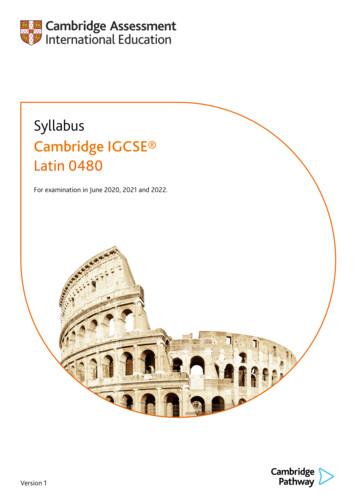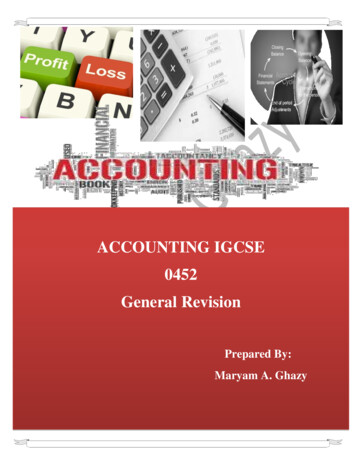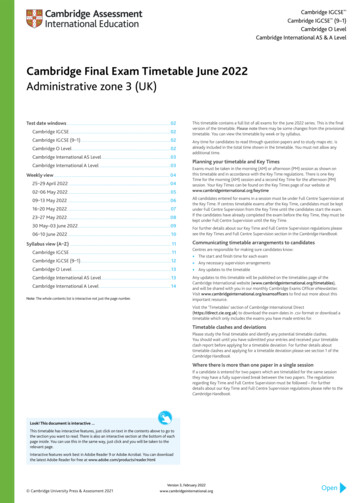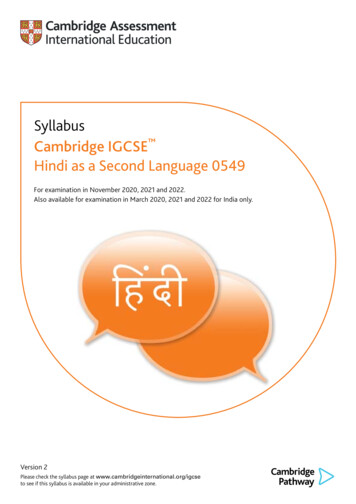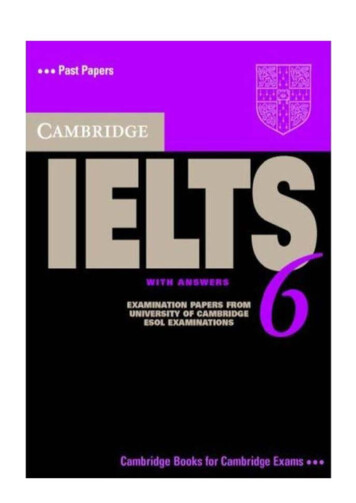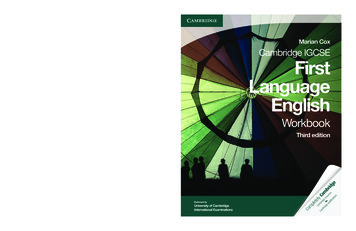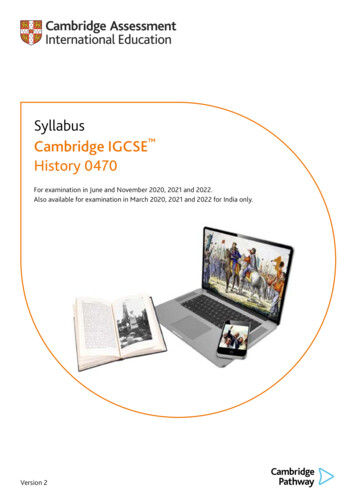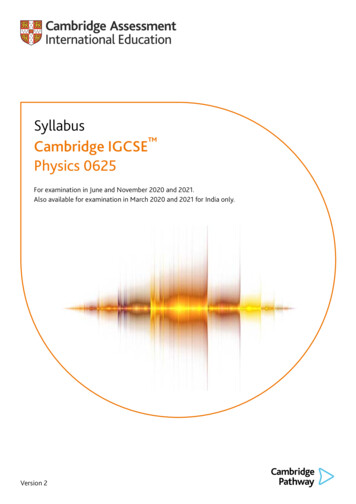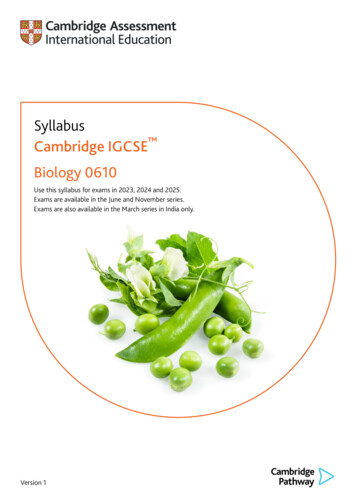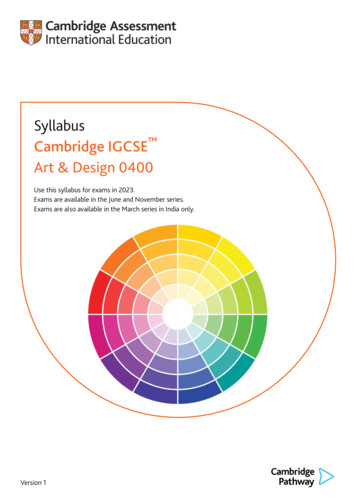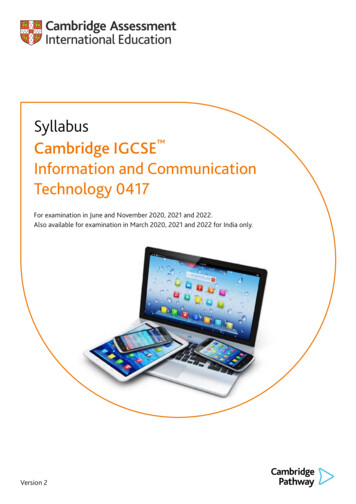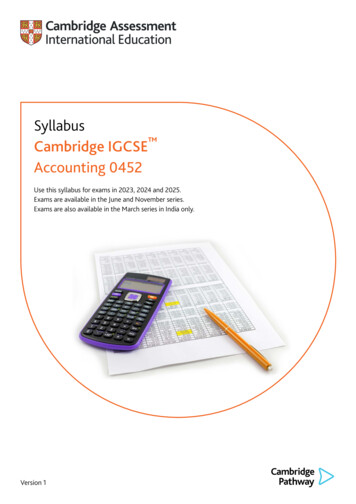
Transcription
SyllabusCambridge IGCSE Accounting 0452Use this syllabus for exams in 2023, 2024 and 2025.Exams are available in the June and November series.Exams are also available in the March series in India only.Version 1
Why choose Cambridge International?Cambridge International prepares school students for life, helping them develop an informed curiosity and a lastingpassion for learning. We are part of the University of Cambridge.Our Cambridge Pathway gives students a clear path for educational success from age 5 to 19. Schools can shapethe curriculum around how they want students to learn – with a wide range of subjects and flexible ways to offerthem. It helps students discover new abilities and a wider world, and gives them the skills they need for life, so theycan achieve at school, university and work.Our programmes and qualifications set the global standard for international education. They are created by subjectexperts, rooted in academic rigour and reflect the latest educational research. They provide a strong platform forlearners to progress from one stage to the next, and are well supported by teaching and learning resources.Our mission is to provide educational benefit through provision of international programmes and qualifications forschool education and to be the world leader in this field. Together with schools, we develop Cambridge learnerswho are confident, responsible, reflective, innovative and engaged – equipped for success in the modern world.Every year, nearly a million Cambridge students from 10 000 schools in 160 countries prepare for their future withthe Cambridge Pathway.‘We think the Cambridge curriculum is superb preparation for university.’Christoph Guttentag, Dean of Undergraduate Admissions, Duke University, USAQuality managementCambridge International is committed to providing exceptional quality. In line with this commitment, ourquality management system for the provision of international qualifications and education programmesfor students aged 5 to 19 is independently certified as meeting the internationally recognised standard,ISO 9001:2015. Learn more at www.cambridgeinternational.org/ISO9001Copyright UCLES September 2020Cambridge Assessment International Education is part of the Cambridge Assessment Group. Cambridge Assessment is the brand name ofthe University of Cambridge Local Examinations Syndicate (UCLES), which itself is a department of the University of Cambridge.UCLES retains the copyright on all its publications. Registered centres are permitted to copy material from this booklet for their owninternal use. However, we cannot give permission to centres to photocopy any material that is acknowledged to a third party even forinternal use within a centre.
Contents1 Why choose this syllabus? . 22 Syllabus overview . 5Aims5Content overview6Assessment overview7Assessment objectives83 Subject content .9Appendix164 Details of the assessment . 17Paper 1 Multiple Choice17Paper 2 Structured Written Paper17Command words18International standards – terminology195 What else you need to know . 20Before you start20Making entries21After the exam22How students and teachers can use the grades22Grade descriptions22Changes to this syllabus for 2023, 2024 and 202523Important: Changes to this syllabusFor information about changes to this syllabus for 2023, 2024 and 2025, go to page 23.The latest syllabus is version 1, published September 2020. There are no significant changes which affectteaching.Any textbooks endorsed to support the syllabus for examination from 2020 are still suitable for use with thissyllabus.
Cambridge IGCSE Accounting 0452 syllabus for 2023, 2024 and 2025.1 Why choose this syllabus?Key benefitsCambridge IGCSE is the world’s most popular international qualification for 14 to 16 year olds, although it can betaken by students of other ages. It is tried, tested and trusted.Students can choose from 70 subjects in any combination – it is taught by over 4800 schools in over 150 countries.Cambridge IGCSE Accounting is accepted by universites and employers as proof of an understanding of the theoryand concepts of accounting, and the ways in which accounting is used in a variety of modern economic andbusiness contexts.Learners focus on the skills of recording, reporting, presenting and interpreting financial information; these form anideal foundation for further study, and for a future career within the profession.The syllabus is structured so that learners attain both practical skills and theoretical knowledge.Our programmes balance a thorough knowledge and understanding of a subject and help to develop the skillslearners need for their next steps in education or employment.Our approach encourages learners to be:Cambridgelearner‘The strength of Cambridge IGCSE qualifications is internationally recognised and has providedan international pathway for our students to continue their studies around the world.’Gary Tan, Head of Schools and CEO, Raffles International Group of Schools, Indonesia2www.cambridgeinternational.org/igcseBack to contents page
Cambridge IGCSE Accounting 0452 syllabus for 2023, 2024 and 2025. Why choose this syllabus?International recognition and acceptanceOur expertise in curriculum, teaching and learning, and assessment is the basis for the recognition of ourprogrammes and qualifications around the world. The combination of knowledge and skills in Cambridge IGCSEAccounting gives learners a solid foundation for further study. Candidates who achieve grades A* to C are wellprepared to follow a wide range of courses including Cambridge International AS & A Level Accounting.Cambridge IGCSEs are accepted and valued by leading universities and employers around the world as evidence ofacademic achievement. Many universities require a combination of Cambridge International AS & A Levels andCambridge IGCSEs or equivalent to meet their entry requirements.UK NARIC, the national agency in the UK for the recognition and comparison of international qualifications andskills, has carried out an independent benchmarking study of Cambridge IGCSE and found it to be comparable tothe standard of the reformed GCSE in the UK. This means students can be confident that their Cambridge IGCSEqualifications are accepted as equivalent to UK GCSEs by leading universities worldwide.Learn more at idge IGCSE is one of the most sought-after and recognised qualifications in the world. Itis very popular in Egypt because it provides the perfect preparation for success at advanced levelprogrammes.’Managing Director of British School in Egypt BSEBack to contents pagewww.cambridgeinternational.org/igcse3
Cambridge IGCSE Accounting 0452 syllabus for 2023, 2024 and 2025. Why choose this syllabus?Supporting teachersWe provide a wide range of resources, detailed guidance and innovative training and professional development sothat you can give your students the best possible preparation for Cambridge IGCSE. To find out which resources areavailable for each syllabus go to our School Support Hub.The School Support Hub is our secure online site for Cambridge teachers where you can find the resources you needto deliver our programmes. You can also keep up to date with your subject and the global Cambridge communitythrough our online discussion forums.Find out more at www.cambridgeinternational.org/supportPlanning and preparationTeaching and assessment Next step guides Endorsed resources Schemes of work Online forums Specimen papers Support for coursework and speaking tests Syllabuses Teacher guidesLearning and revisionSupportfor CambridgeIGCSE Example candidate responsesResults Candidate Results Service Learner guides Principal examiner reports for teachers Past papers and mark schemes Results Analysis Specimen paper answersSign up for email notifications about changes to syllabuses, including new and revised products and services ofessional developmentWe support teachers through: Introductory Training – face-to-face or online Extension Training – face-to-face or online Enrichment Professional Development – face-to-face or onlineFind out more at www.cambridgeinternational.org/events Cambridge Professional Development QualificationsFind out more at www.cambridgeinternational.org/profdevSupporting exams officersWe provide comprehensive support and guidance for all Cambridge exams officers. Find out more ridgeinternational.org/igcseBack to contents page
Cambridge IGCSE Accounting 0452 syllabus for 2023, 2024 and 2025.2 Syllabus overviewAimsThe aims describe the purposes of a course based on this syllabus.The aims are to enable students to develop: knowledge and understanding of the principles and purposes of accounting for individuals, businesses,non-trading organisations and society as a whole an understanding of accounting concepts, principles, policies, techniques, procedures and terminology improved skills of numeracy, literacy, communication, enquiry, presentation and interpretation improved accuracy, orderliness and the ability to think logically an excellent foundation for advanced study.Cambridge Assessment International Education is an education organisation and politically neutral.The contents of this syllabus, examination papers and associated materials do not endorse any politicalview. We endeavour to treat all aspects of the exam process neutrally.Back to contents pagewww.cambridgeinternational.org/igcse5
Cambridge IGCSE Accounting 0452 syllabus for 2023, 2024 and 2025. Syllabus overviewContent overview1 The fundamentals of accountingThis section introduces the subject by explaining the difference between book-keeping and accounting. Therole of accounting in providing information and the purposes of measuring business profit and loss are alsoexplored. Basic accounting terms and the accounting equation are introduced.2 Sources and recording of dataThe core topic of this section is the double entry system of book-keeping and how this is applied in thepreparation of ledger accounts. The division of the ledger is considered. Business documents and their use assources of information are also included. Consideration is given to the procedures for processing information inbooks of prime entry.3 Verification of accounting recordsThis section concentrates on the use of trial balances, bank reconciliation statements and control accounts asmeans of verifying accounting records. The procedures for the correction of errors are also covered.4 Accounting proceduresWithin this section, consideration is given to the importance of distinguishing between capital and revenueexpenditure and receipts. Non-current assets are further explored in terms of accounting for depreciationand disposals. Procedures to record adjustments for accruals and prepayments, irrecoverable debts, provisionof doubtful debts and the recovery of debts written off are included. Inventory valuation, and its impact onfinancial statements, is also covered.5 Preparation of financial statementsThe focus of this section is the preparation of financial statements, including year-end adjustments, fordifferent types of businesses (sole traders, partnerships and limited companies). Consideration is also given tothe financial statements of clubs and societies and manufacturing businesses. The procedures employed whenonly incomplete records are available are also covered.6 Analysis and interpretationThis section introduces the calculation and the interpretation of the main accounting ratios. The use of ratiosin inter-firm comparison is also included. Consideration is also given to the uses of accounting information byinterested parties. The limitations of accounting statements are also explored.7 Accounting principles and policiesThe main accounting principles are introduced together with how they are applied in accounting records andstatements. Consideration is also given to the influence of international accounting standards and the selectionof accounting policies.Appendix Accounting ratiosThe accounting ratios are given in full.6www.cambridgeinternational.org/igcseBack to contents page
Cambridge IGCSE Accounting 0452 syllabus for 2023, 2024 and 2025. Syllabus overviewAssessment overviewAll candidates take two papers. Candidates will be eligible for grades A* to G.All candidates take:Paper 1Multiple Choiceand:1 hour 15 minutes30%Paper 2Structured Written Paper1 hour 45 minutes70%35 marks100 marksMultiple-choice questionsQuestions will be based on all syllabus contentQuestions will be based on all syllabus contentExternally assessedExternally assessedInformation on availability is in the Before you start section.Back to contents pagewww.cambridgeinternational.org/igcse7
Cambridge IGCSE Accounting 0452 syllabus for 2023, 2024 and 2025. Syllabus overviewAssessment objectivesThe assessment objectives (AOs) are:AO1 Knowledge and understandingCandidates should be able to: demonstrate knowledge and understanding of facts, terms, principles, policies, procedures and techniques thatare in the syllabus demonstrate understanding of knowledge through numeracy, literacy, presentation and interpretation andapply this knowledge and understanding in various accounting situations and problems.AO2 AnalysisCandidates should be able to: select data which is relevant to identified needs of business order, analyse and present information in an appropriate accounting form.AO3 EvaluationCandidates should be able to: interpret and evaluate accounting information and draw reasoned conclusions.Weighting for assessment objectivesThe approximate weightings allocated to each of the assessment objectives (AOs) are summarised below.Assessment objectives as a percentage of the qualificationAssessment objectiveWeighting in IGCSE %AO1 Knowledge and understanding65AO2 Analysis25AO3 Evaluation10Total100Assessment objectives as a percentage of each componentAssessment objectivePaper 1Paper 2AO1 Knowledge and understanding8060AO2 Analysis2025AO3 Evaluation015100100Total8Weighting in components %www.cambridgeinternational.org/igcseBack to contents page
Cambridge IGCSE Accounting 0452 syllabus for 2023, 2024 and 2025.3 Subject contentThis syllabus gives you the flexibility to design a course that will interest, challenge and engage your learners.Where appropriate you are responsible for selecting topics, subject contexts, resources and examples to supportyour learners’ study. These should be appropriate for the learners’ age, cultural background and learning context aswell as complying with your school policies and local legal requirements.In all of the following, candidates are required to apply their understanding to a variety of accounting scenarios.Candidates should be able to make simple decisions based upon the analysis and evaluation of informationprovided.Candidates should be able to do the following.1The fundamentals of accounting1.1 The purpose of accounting understand and explain the difference between book-keeping and accounting state the purposes of measuring business profit and loss explain the role of accounting in providing information for monitoring progress and decision-making.1.2 The accounting equation explain the meaning of assets, liabilities and owner’s equity explain and apply the accounting equation.2Sources and recording of data2.1 The double entry system of book-keeping outline the double entry system of book-keeping process accounting data using the double entry system prepare ledger accounts post transactions to the ledger accounts balance ledger accounts as required and make transfers to financial statements interpret ledger accounts and their balances recognise the division of the ledger into the sales ledger, the purchases ledger and the nominal (general)ledger.Candidates do not need to explain or use folio columns.Candidates do not need to explain or use three-column running-balance accounts.Back to contents pagewww.cambridgeinternational.org/igcse9
Cambridge IGCSE Accounting 0452 syllabus for 2023, 2024 and 2025. Subject content2Sources and recording of data continued2.2 Business documents recognise and understand the following business documents: invoice, debit note, credit note, statement ofaccount, cheque, receipt complete pro-forma business documents understand the use of business documents as sources of information: invoice, credit note, chequecounterfoil, paying-in slip, receipt, bank statement.2.3 Books of prime entry explain the advantage of using various books of prime entry explain the use of and process accounting data in the books of prime entry: cash book, petty cash book,sales journal, purchases journal, sales returns journal, purchases returns journal and the general journal post the ledger entries from the books of prime entry distinguish between and account for trade discount and cash discounts explain the dual function of the cash book as a book of prime entry and as a ledger account for bank andcash explain the use of and record payments and receipts made by bank transfers and other electronic means explain and apply the imprest system of petty cash.3Verification of accounting records3.1 The trial balance understand that a trial balance is a statement of ledger balances on a particular date outline the uses and limitations of a trial balance prepare a trial balance from a given list of balances and amend a trial balance which contains errors identify and explain those errors which do not affect the trial balance: commission, compensating, completereversal, omission, original entry, principle.3.2 Correction of errors correct errors by means of journal entries explain the use of a suspense account as a temporary measure to balance the trial balance correct errors by means of suspense accounts adjust a profit or loss for an accounting period after the correction of errors understand the effect of correction of errors on a statement of financial position.3.3 Bank reconciliation10 understand the use and purpose of a bank statement update the cash book for bank charges, bank interest paid and received, correction of errors, credit transfers,direct debits, dividends, and standing orders understand the purpose of and prepare a bank reconciliation statement to include bank errors, uncrediteddeposits and unpresented cheques.www.cambridgeinternational.org/igcseBack to contents page
Cambridge IGCSE Accounting 0452 syllabus for 2023, 2024 and 2025. Subject content3Verification of accounting records continued3.4 Control accounts understand the purposes of purchases ledger and sales ledger control accounts identify the books of prime entry as sources of information for the control account entries prepare purchases ledger and sales ledger control accounts to include credit purchases and sales, receiptsand payments, cash discounts, returns, irrecoverable debts, dishonoured cheques, interest on overdueaccounts, contra entries, refunds, opening and closing balances (debit and credit within each account).Candidates do not need to prepare control accounts which are part of the double entry system.Candidates do not need to reconcile control account balances with the sales and purchases ledger balances.4Accounting procedures4.1 Capital and revenue expenditure and receipts distinguish between and account for capital expenditure and revenue expenditure distinguish between and account for capital receipts and revenue receipts calculate and comment on the effect on profit of incorrect treatment calculate and comment on the effect on asset valuations of incorrect treatment.4.2 Accounting for depreciation and disposal of non-current assets define depreciation explain the reasons for accounting for depreciation name and describe the straight-line, reducing balance and revaluation methods of depreciation prepare ledger accounts and journal entries for the provision of depreciation prepare ledger accounts and journal entries to record the sale of non-current assets, including the use ofdisposal accounts.4.3 Other payables and other receivables recognise the importance of matching costs and revenues prepare ledger accounts and journal entries to record accrued and prepaid expenses prepare ledger accounts and journal entries to record accrued and prepaid incomes.4.4 Irrecoverable debts and provision for doubtful debts understand the meaning of irrecoverable debts and recovery of debts written off prepare ledger accounts and journal entries to record irrecoverable debts prepare ledger accounts and journal entries to record recovery of debts written off explain the reasons for maintaining a provision for doubtful debts prepare ledger accounts and journal entries to record the creation of, and adjustments to, a provision fordoubtful debts.Back to contents pagewww.cambridgeinternational.org/igcse11
Cambridge IGCSE Accounting 0452 syllabus for 2023, 2024 and 2025. Subject content4Accounting procedures continued4.5 Valuation of inventory understand the basis of the valuation of inventory at the lower of cost and net realisable value prepare simple inventory valuation statements recognise the importance of valuation of inventory and the effect of an incorrect valuation of inventory ongross profit, profit for the year, equity and asset valuation.5Preparation of financial statements5.1 Sole traders explain the advantages and disadvantages of operating as a sole trader explain the importance of preparing income statements and statements of financial position explain the difference between a trading business and a service business prepare income statements for trading businesses and for service businesses understand that statements of financial position record assets and liabilities on a specified date recognise and define the content of a statement of financial position: non-current assets, intangible assets,current assets, current liabilities, non-current liabilities and capital understand the inter-relationship of items in a statement of financial position prepare statements of financial position for trading businesses and service businesses make adjustments for provision for depreciation using the straight line, reducing balance and revaluationmethods make adjustments for accrued and prepaid expenses and accrued and prepaid income make adjustments for irrecoverable debts and provisions for doubtful debts make adjustments for goods taken by the owner for own use.5.2 Partnerships explain the advantages and disadvantages of forming a partnership outline the importance and contents of a partnership agreement explain the purpose of an appropriation account prepare income statements, appropriation accounts and statements of financial position record interest on partners’ loans, interest on capital, interest on drawings, partners’ salaries and the divisionof the balance of profit or loss make adjustments to financial statements as detailed in 5.1 (sole traders) explain the uses of and differences between capital and current accounts draw up partners’ capital and current accounts in ledger account form and as part of a statement offinancial position.Candidates will not be required to answer questions on the admission/departure of a partner, the dissolution of apartnership or changes to a profit sharing ratio.12www.cambridgeinternational.org/igcseBack to contents page
Cambridge IGCSE Accounting 0452 syllabus for 2023, 2024 and 2025. Subject content5Preparation of financial statements continued5.3 Limited companies explain the advantages and disadvantages of operating as a limited company understand the meaning of the term limited liability understand the meaning of the term equity understand the capital structure of a limited company comprising preference share capital, ordinary sharecapital, general reserve and retained earnings understand and distinguish between issued, called-up and paid-up share capital understand and distinguish between share capital (preference shares and ordinary shares) and loan capital(debentures) prepare income statements, statements of changes in equity and statements of financial position make adjustments to financial statements as detailed in 5.1 (sole traders).Candidates will not be expected to understand cumulative and non-cumulative preference shares, rights issues, sharepremium or capital redemption reserve. However, candidates should understand the difference between redeemableand non-redeemable preference shares.5.4 Clubs and societies distinguish between receipts and payments accounts and income and expenditure accounts prepare receipts and payments accounts prepare accounts for revenue-generating activities, e.g. refreshments, subscriptions prepare income and expenditure accounts and statements of financial position make adjustments to financial statements as detailed in 5.1 (sole traders) define and calculate the accumulated fund.5.5 Manufacturing accounts distinguish between direct and indirect costs understand direct material, direct labour, prime cost and factory overheads understand and make adjustments for work in progress calculate factory cost of production prepare manufacturing accounts, income statements and statements of financial position make adjustments to financial statements as detailed in 5.1 (sole traders).5.6 Incomplete records explain the disadvantages of not maintaining a full set of accounting records prepare opening and closing statements of affairs calculate profit or loss for the year from changes in capital over time calculate sales, purchases, gross profit, trade receivables and trade payables and other figures fromincomplete information prepare income statements and statements of financial position from incomplete records make adjustments to financial statements as detailed in 5.1 (sole traders) apply the techniques of mark-up, margin and inventory turnover to arrive at missing figures.Candidates will only be asked questions on incomplete records in relation to sole trader businesses.Back to contents pagewww.cambridgeinternational.org/igcse13
Cambridge IGCSE Accounting 0452 syllabus for 2023, 2024 and 2025. Subject content6Analysis and interpretation6.1 Calculation and understanding of accounting ratiosCandidates should be able to understand, calculate and explain the importance of the following accountingratios: Gross margin Profit margin Return on capital employed (ROCE) Current ratio Liquid (acid test) ratio Rate of inventory turnover (times) Trade receivables turnover (days) Trade payables turnover (days)6.2 Interpretation of accounting ratios prepare and comment on simple statements showing comparison of results for different years make recommendations and suggestions for improving profitability and working capital understand the significance of the difference between the gross margin and the profit margin as an indicatorof a business’s efficiency explain the relationship of gross profit and profit for the year to the valuation of inventory, rate of inventoryturnover, revenue, expenses, and equity.6.3 Inter-firm comparison understand the problems of inter-firm comparison apply accounting ratios to inter-firm comparison.6.4 Interested partiesCandidates should be able to explain the uses of accounting information by the following interested parties fordecision-making: owners managers trade payables banks investors club members other interested parties such as governments, tax authorities, etc.6.5 Limitations of accounting statementsCandidates should be able to recognise the limitations of accounting statements due to such factors as:14 historic cost difficulties of definition non-financial aspectswww.cambridgeinternational.org/igcseBack to contents page
Cambridge IGCSE Accounting 0452 syllabus for 2023, 2024 and 2025. Subject content7Accounting principles and policies7.1 Accounting principlesCandidates should be able to explain and recognise the application of the following accounting principles: matching historic cost business entity materiality consistency money measurement duality prudence going concern realisation7.2 Accounting policiesCandidates should be able to recognise the influence of international accounting standards and understand thefollowing objectives in selecting accounting policies: comparability relevance reliability understandabilityBack to contents pagewww.cambridgeinternational.org/igcse15
Cambridge IGCSE Accounting 0452 syllabus for 2023, 2024 and 2025. Subject contentAppendixAccounting ratiosCommonly used accounting ratiosCandidates should know the following accounting ratios:Profitability ratios(i) Gross marginGross Profit 100RevenueMark up Gross Profit 100Cost of sales(ii) Profit marginProfit for the year 100Revenue(iii) Return on Capital Employed (ROCE)Net profit before interest 100Capital employed[Capital Employed Issued Shares Reserves Non-Current Liabilities]Liquidity ratios(i) Current ratio Current Assets(also known as Working Capital Ratio)Current Liabilities(ii) Liquid (Acid test) Ratio Current Assets – Inventory(also known as Quick Ratio)Current Liabilities(iii) Rate of Inventory Turnover Cost of Goods Sold(answer given in times)Average Inventory(iv) Trade Receivables Turnover Trade Receivables 365 (answer given in days)Credit Sales(v) Trade Payables Turnover 16Trade Payables 365 (answer given in days)Credit Purchaseswww.cam
Accounting 0452 Use this syllabus for exams in 2023, 2024 and 2025. . Cambridge Assessment International Education is part of the Cambridge Assessment Group. Cambridge Assessment is the brand name of . skills, has carried out an independent benchmarking study of Cambridge IGCSE and found it to be comparable to
